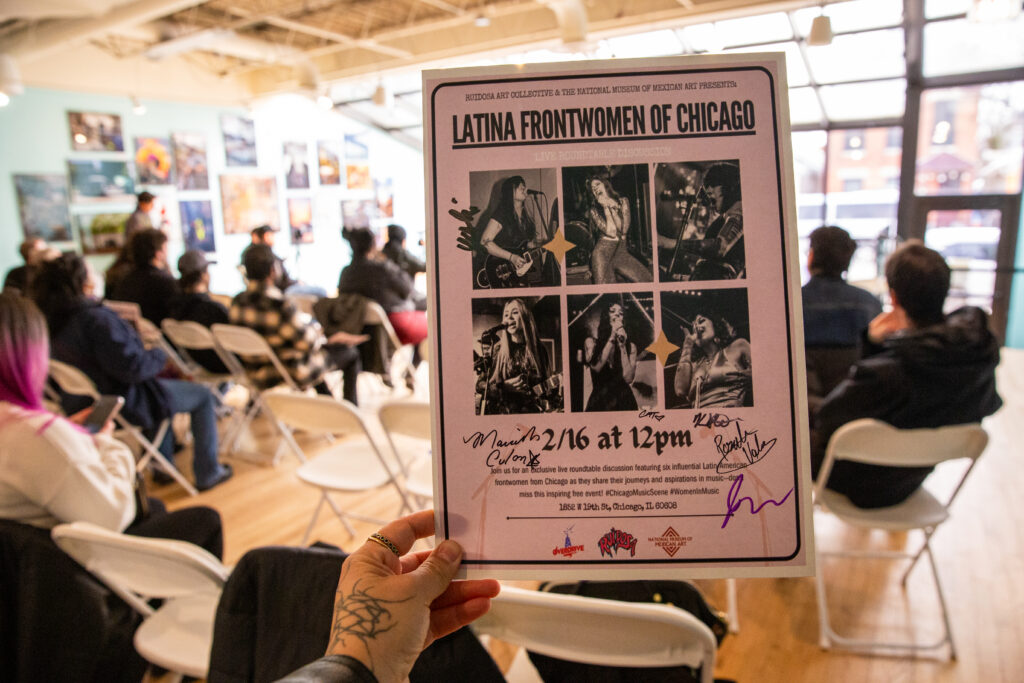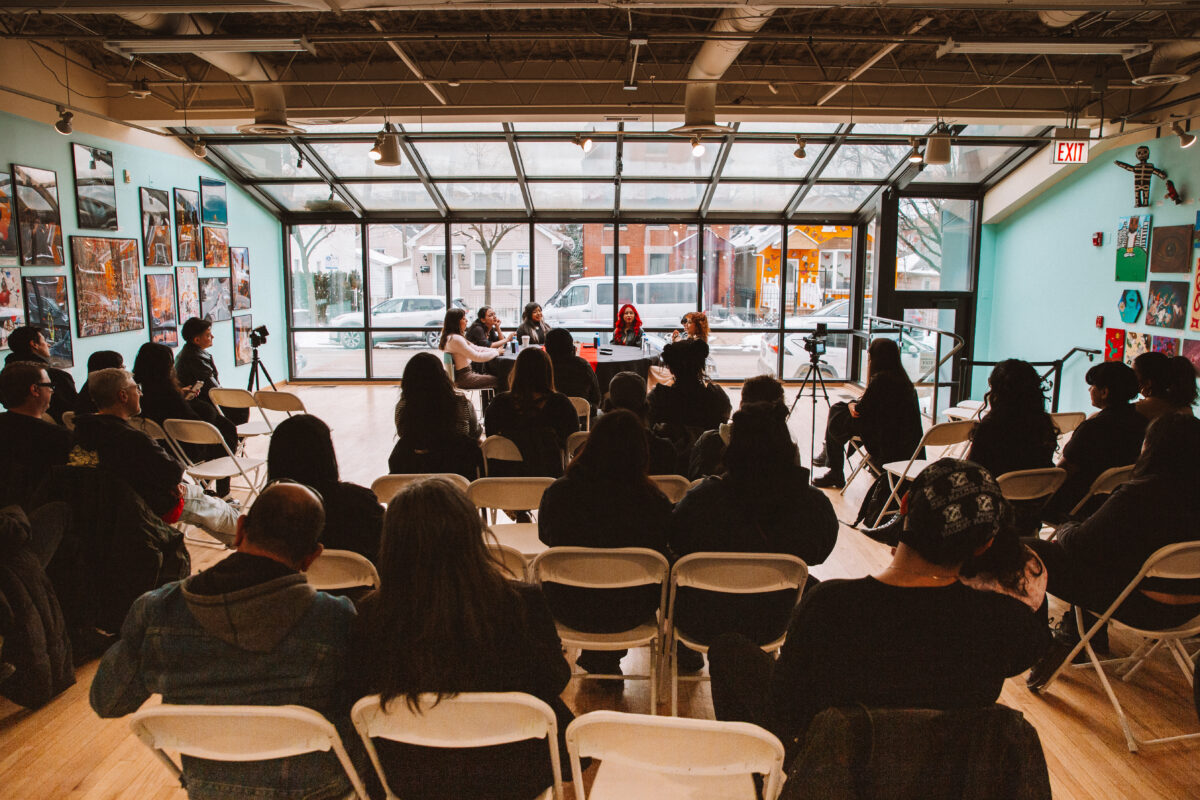Six Latina frontwomen from bands across the city gathered at the National Museum of Mexican Art in Pilsen for a round table discussion rooted in sisterhood. Surrounded by local high-schoolers’ artwork and bathed in natural light streaming through floor-to-ceiling windows, a live audience quietly shuffled in, eager to witness the conversation unfold.
“Growing up as a Latinoamericana, I never really grew up seeing myself in the genre that I love, which is rock music,” said Yeshi Regalado, co-founder of the hosting collective Ruidosa and the frontwoman of burgeoning rock band La Rosa Noir.
As part of the museum’s annual Sor Juana Festival and in collaboration with Ruidosa, Overdrive productions filmed the event, set to be released next month on International Women’s Day. It is the thirty-first iteration of the Sor Juana Festival, a celebration honoring Sor Juana Ines de la Cruz, a feminist nun who fought for women’s rights to education in Mexico. The festival has previously featured iconic Chicago Latinas such as Mexican-American authors Sandra Cisneros, Maria Hinojosa, and Erika Sánchez. This year’s Sor Juana Festival kicks off on March 8 with a performance by Mariachi Sirenas and the debut of the filmed conversation. It will extend until April 26.
“This festival is really about showing the unique and powerful contributions that women have made into society, whether that’s arts, literature, dance, theater, performance,” said Jaime Ortega, the museum’s digital production and performing arts manager.
This year was no exception. Joining Regalado at the table was Cat Ayala from Scarlet Demore, Karly Soto from Snuffed and Pasture, Jessica Covarrubias from Future Nobodies, Rosalba Valdez, and Mariah Colon. The powerhouse lineup encompassed artists representing genres ranging from post-punk to rancheras to hardcore, one thing connecting them all—their love for creating and expression through music.
“Being a frontwoman is so empowering,” Ayala said to the table of women, who all agreed that navigating a white male-dominated industry and machista Latino culture has been challenging, but undeniably worthwhile. She recalled a time when a fan reached out to thank her for the music. “You make music for the girls that will never get their revenge,” read the message.
Ayala’s advice for Latinas—or anyone who is currently pursuing their dreams—was simple. “Just don’t give up,” she said. “You can do anything you want if you just don’t give up and give yourself enough time and you trust the process.”
The roundtable discussion touched on topics like dating, mental health, and motherhood. Covarrubias shared her experience of becoming a mom and making the choice to still pursue a path in music, not only for herself, but as an example for her daughter to follow.
“I think it’s cool that we’re paving something that’s never been done before,” Covarrubias said. “We’re not afraid to speak, to be front and center.”
Covarrubias is the lead vocalist for Future Nobodies, a post-punk, new wave trio that was the local opening act at Riot Fest in 2023. She was joined by her brother, Angel Covarrubias, and the father of her daughter, Cesar Salceda-Olivares. She emphasized the importance of pouring into one’s self so that in turn you can pour into others.
It was a sentiment Colon resonated with when it comes to her mental health and holding herself accountable. “I’m negating my mental health that is then bleeding into everyone’s life,” Colon recalled as she shared her experience of living with ADHD, being neurodivergent and feeling like a bad bandmate.
Mental health is a topic especially important for Latinas, who report higher rates of depression and anxiety. According to the American Psychological Association, Latinas are twice as likely to develop depression in comparison to not only Latino men, but also white and Black men.

Colon’s single with Amy Dabbs, “HARD 2 LOVE,” was released last August and touches on topics of self-reflection, heartache, and acceptance, offering an expression of emotional vulnerability. Similarly, the conversation veered into musical success and how not only sharing stages but watching each other perform has been a huge source of inspiration and motivation—showing how the personal and artistic journeys of these women are deeply interconnected.
“I want to scream like that,” Ayala said as she told the story of the first time she saw Karly Soto perform.
Soto is the lead singer of the hardcore punk band Snuffed and the metal band Pasture, which dropped their newest project, Out To Pasture, this past Valentine’s Day. They all shared how revitalizing it continues to be to watch each other perform and see strong women leads across the city. They all expressed how each year they feel closer to reaching their truest version of themselves musically and introspectively.
“If I die tomorrow, I just want to be content with what I’m putting out,” Rosalba Valdez said. She released her five-track Amor Eterno EP last October, blending traditional Mexican folk music with contemporary influences.
“Everything that we’re putting out there this year is me,” Regalado echoed.
Regalado’s band La Rosa Noir and Valdez both performed at the Selena Tribute Concert last September at the Jay Pritzker Pavilion in Millennium Park. The two remembered how special the moment was to play tribute to one of the most notable Latinas in musical history, Selena.
For the museum, it was an easy decision to host a conversation between six inspiring women who not only nurture each other but everyone else through their music.
“One of the things that we always try to make sure [of] is that we highlight the voices of artists. We highlight the voices of people that really seek to uplift the Mexican, the Latino experience,” Ortega said.
Regalado, who curated the event, emphasized how uniquely Chicago it is for Latina frontwomen across all genres to come together and connect around shared experiences.
“There’s definitely a sisterhood that exists within the Latina frontwomen in Chicago that I haven’t seen exist anywhere else,” she said. “To be able to see them and to know them is to be able to see myself and have my existence be validated, which is a really powerful feeling.”
Jocelyn Martinez-Rosales is a Mexican American independent journalist from Belmont Cragin who is passionate about covering communities of color with a social justice lens. She is a senior editor at the Weekly.

